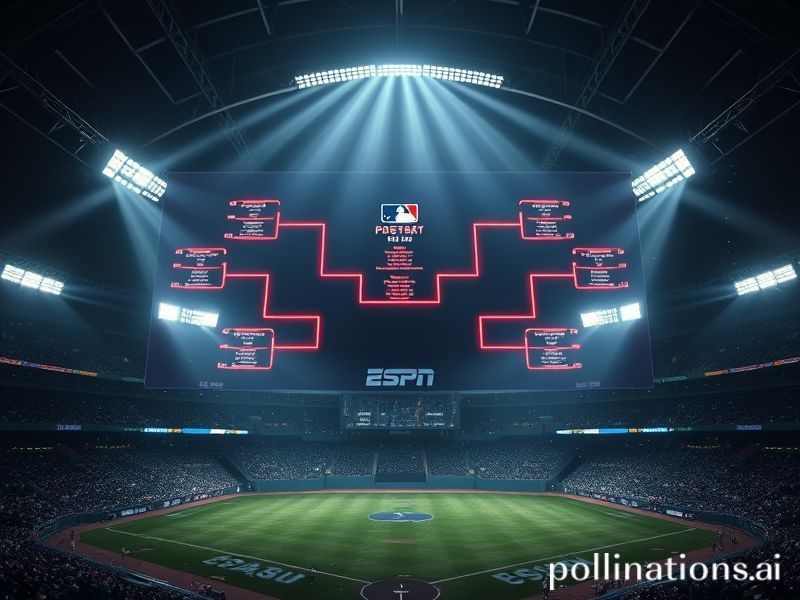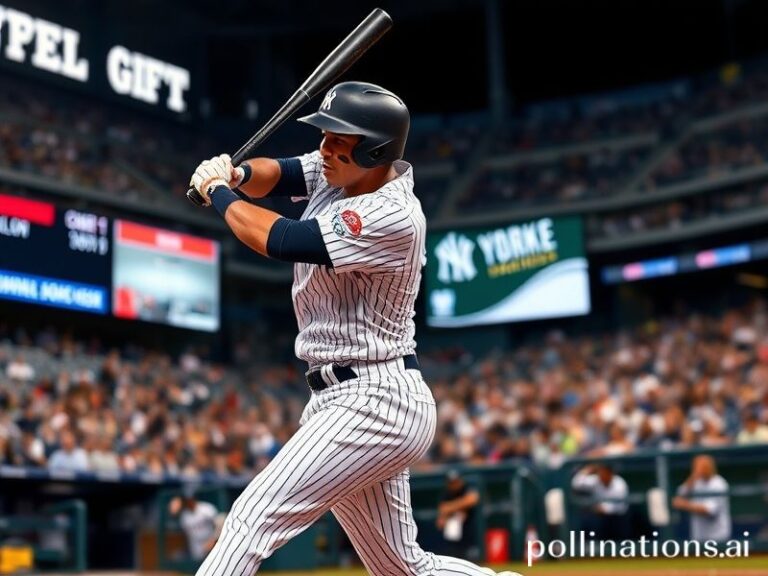MLB Playoff Bracket: America’s Annual Geopolitical Flowchart Masquerading as Sport
If you squint at the MLB playoff bracket long enough it starts to look like a Rorschach test for geopolitics: twelve blots of color arranged in neat little brackets, promising order where none actually exists. From a barstool in Montevideo or a rooftop in Lagos, the diagram is less a sports schedule than a coded message from a superpower that still insists baseball is “America’s pastime,” even though 96 % of humanity would rather watch paint dry—preferably paint drying on a soccer ball.
Let’s translate the bracket for the uninitiated. The “Wild Card Series” is not, alas, a Las Vegas stag party; it’s a sudden-death fling in which perennial underachievers (hello, Toronto) are granted one hasty coin-flip to justify their bloated payrolls. Winners advance to the Division Series, where the real aristocracy—Dodgers, Yankees, Braves—wait with the patience of Swiss bankers guarding Nazi gold. After that come the League Championship Series, a best-of-seven slog designed to ensure television partners can sell insurance to insomniacs on three continents. Finally, the World Series, a planetary misnomer since the only “world” involved stretches from San Diego to the Jersey Turnpike.
Internationally, the bracket’s symbolism is hard to miss. The United States has exported many things—fast food, drone warfare, sub-prime mortgages—but the playoff bracket may be its most honest artifact: a flow chart that promises meritocracy while quietly rigging the game for the richest teams. Luxury-tax thresholds function like IMF conditionality clauses: break them and you’re punished, but only mildly, because the league needs its whales solvent enough to keep swimming. Meanwhile, small-market clubs serve the same role as developing nations in climate negotiations: invited to the table, handed a microphone, then politely ignored when the check arrives.
Overseas audiences watch with the detached fascination of tourists observing a cockfight. In Japan, fans track Shohei Ohtani’s Angels-less October the way Europeans monitor American politics—equal parts horror and rubbernecking. Korean sportswriters tally how many of their KBO stars will be poached next season, the same way they count semiconductor engineers boarding flights to San Jose. Latin American viewers, whose nations supply roughly 30 % of MLB labor, see the bracket as a talent diaspora chart: flags of the Dominican, Venezuela, Cuba, and Puerto Rico pinned to individual boxes like exotic postage stamps on an Amazon package.
There is, of course, the money. The playoff bracket is worth roughly one billion U.S. dollars in broadcast rights, digital gambling, and corporate hospitality—coincidentally the same amount the World Food Programme requested this year to avert famine in the Horn of Africa. One imagines the cash stacked in left field at Dodger Stadium, guarded by a bored left-fielder scrolling Instagram between pitches. Meanwhile, global supply chains wheeze, glaciers calve, and crypto exchanges evaporate, but the bracket stands immutable, a spreadsheet of hope in a hopeless time.
And yet, cynicism has its limits. Somewhere in Sydney, an eight-year-old stays up past midnight to watch Julio Rodríguez rob a home run, and for a moment the Pacific feels smaller. In Rotterdam, a data analyst feeds exit-velocity numbers into a model that also tracks shipping-container wait times at the Port of Los Angeles, finding solace in the illusion that randomness can still be quantified. Even the most jaded correspondent must concede that the bracket, for all its farcical pageantry, offers a rare global shared clock: every October, the planet pauses—briefly—to argue about curveballs instead of cruise missiles.
So here we are. Twelve teams enter, one team leaves with a trophy named after a dead newspaper man. The rest of us exit with nothing but the comfort of ritual, the same way we endure New Year’s Eve or tax season. The bracket will reset next spring, the rich will reload, the poor will retool, and somewhere a GM will convince himself that trading three teenagers for a 33-year-old reliever is “win-now.” In the grand casino of human folly, the MLB playoff bracket is simply the table with the most colorful chips. Pull up a chair, Earth; the house always wins, but at least the peanuts are free.







